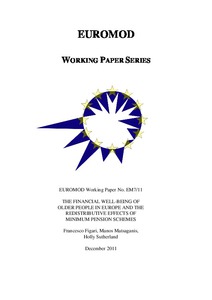The financial well-being of older people in Europe and the redistributive effects of minimum pension schemes
"This study analyses the financial well-being of elderly people across Europe. Using the European microsimulation model EUROMOD, which facilitates the identification of minimum pension schemes in a comparable way across countries, we show the extent to which these schemes serve to reduce the ri...
| Main Authors: | , , , |
|---|---|
| Institution: | ETUI-European Trade Union Institute |
| Format: | TEXT |
| Language: | English |
| Published: |
Colchester
2011
ISER |
| Subjects: | |
| Online Access: | https://www.labourline.org/KENTIKA-19135180124919533629-The-financial-well-being-of-ol.htm |
| Summary: | "This study analyses the financial well-being of elderly people across Europe. Using the European microsimulation model EUROMOD, which facilitates the identification of minimum pension schemes in a comparable way across countries, we show the extent to which these schemes serve to reduce the risk of poverty among elderly. The main findings show that there is a strong correlation between the resources allocated to the minimum pension schemes and the reduction in poverty risk among the elderly. Nevertheless, the financial well-being of older people depends crucially on the pension system as a whole. Countries with generous minimum pension schemes seem to allocate relatively fewer resources to other pillars of the pension system. On the one hand, they are more effective in reducing elderly poverty rates. On the other hand, they fail to ensure a level of financial well-being of older people in line with the overall population." |
|---|---|
| Physical Description: | 27 p. Digital |

